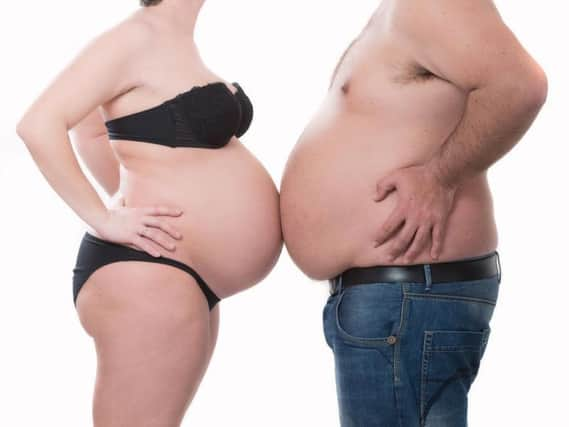Fat couples take longer to conceive, research reveals


Couples in which both partners are morbidly obese can take 59 per cent longer to conceive than people of a normal weight.
But even those that are just obese struggle to have children.
Advertisement
Hide AdAdvertisement
Hide AdResearchers from the National Institute of Health said the findings confirmed obesity reduces fertility chances.
And they say experts should take couples' weight into consideration when offering fertility advice.
They studied 501 couples between 2005 and 2008, where the men were over 18 and the women were aged between 18 and 44.
Women kept journals to record their monthly menstrual cycles, sex with their partners, and results of home pregnancy tests.
Advertisement
Hide AdAdvertisement
Hide AdThey were then followed until pregnancy or for up to one year of trying to conceive.
Scientists also calculated the participants' BMIs and categorised obese couples into class 1 having a BMI from 30-35, and class 2 of having BMIs greater than 35.
They compared the average time it took to get pregnant among the non-obese group, which had 228 women, the class 1 group of 75 women and class 2 group with 69 women.
Using a statistical measure called the fecundability odds ratio (FOR) they then calculated the probability that a couple would get pregnant.
Advertisement
Hide AdAdvertisement
Hide AdCouples in the non-obese group had an FOR score of 1, compared to .45 for class 2 obese couples - which indicates they took 55 per cent longer to conceive than those of normal weight.
When the study took into account other factors known to influence fertility, such as age, smoking status, physical activity and cholesterol level, the ratio for class 2 couples dropped to .41 - a 59 per centre longer time to achieve pregnancy.
Previous research has focused mainly on just the female partner's BMI, but findings similar to the study have been reported among couples that are undergoing IVF.
Lead author Dr Rajeshwari Sundaram said: "A lot of studies on fertility and body composition have focused on the female partner, but our findings underscore the importance of including both partners.
"Our results also indicate that fertility specialists may want to consider couples' body compositions when counselling patients."
The study was published in the journal Human Reproduction.